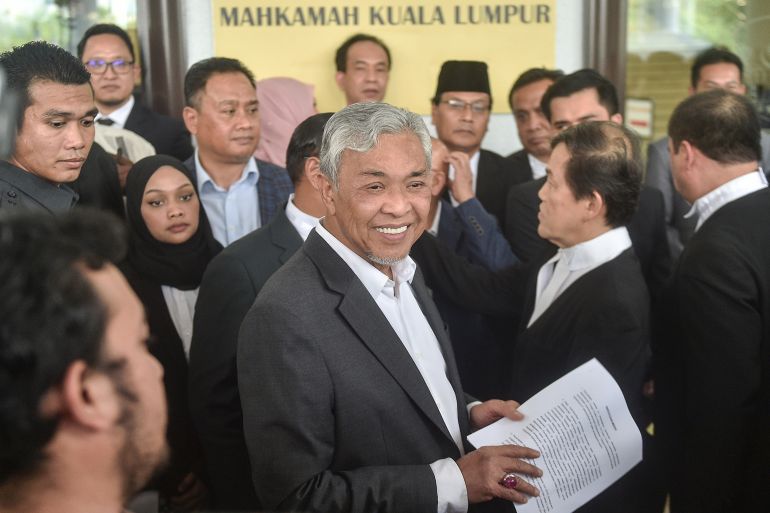Malaysia drops corruption case against deputy prime minister
Decision made at prosecution’s request, raising questions over government’s commitment to tackling graft.

Malaysia has dropped a multimillion-dollar corruption case against Deputy Prime Minister Ahmad Zahid Hamidi on charges he defrauded a foundation.
Zahid had faced 47 charges involving multiple counts of criminal breach of trust, corruption and money laundering related to the misuse of $27m of funds at Yayasan Akalbudi, a charity he established to eradicate poverty.
Keep reading
list of 4 items1MDB fugitive Jho Low placed in Macau as associates in spotlight
Malaysian court rejects ex-PM Najib bid to review corruption case
Malaysia’s ex-PM Muhyiddin Yassin charged with corruption
The Malay Mail reported that Judge Collin Lawrence Sequerah agreed on Monday to grant Zahid a discharge not amounting to an acquittal after the prosecution said it needed more time to look into the case.
A discharge not amounting to an acquittal means the prosecution can revive the charges at a later date if it wants.
“My family and I are grateful that the court has discharged me of all 47 charges,” said Zahid, who had pleaded not guilty and said the charges were politically motivated.
The defence had asked for a full acquittal and Zahid’s lawyers said planned to appeal the discharge ruling.
Zahid was charged with corruption in 2018 a few months after the once dominant United Malays National Organisation (UMNO) lost power for the first time in 60 years over widespread anger at graft and the multibillion-dollar scandal at the 1MDB state fund.
In November’s general election, Anwar Ibrahim’s coalition fell just short of an absolute majority and worked out a coalition with UMNO and a number of other parties to form a government.
Anwar’s Pakatan Harapan coalition had campaigned on a platform of tackling corruption, and Zahid’s discharge may add to concerns about cases against other prominent politicians, including former Prime Minister Najib Razak. Najib is currently serving a 12-year prison sentence in a 1MDB-linked case and faces a number of other 1MDB trials.
Maria Chin Abdullah, a reformist former lawmaker and prominent member of civil society, criticised the decision as a “sad day for democracy” and urged a “fuller explanation” from the prosecution on why it wanted to drop the case.
“Citizens went onto the streets to protest against corrupt leaders and we expect justice to be served,” Chin Abdullah said in a statement. “The ]discharge\ decision is a setback and tantamount to saying: ‘Corruption is OK!'”
In March, Anwar promised to tackle corruption “without fear or favour“.
He has said he would not interfere in court processes.
Zahid’s trial started on November 18, 2019.
In January last year, the court said the prosecution had presented sufficient evidence for the case to proceed, and Zahid was ordered to enter his defence.
The prosecution called 99 witnesses and 15 witnesses had appeared for Zahid’s defence.